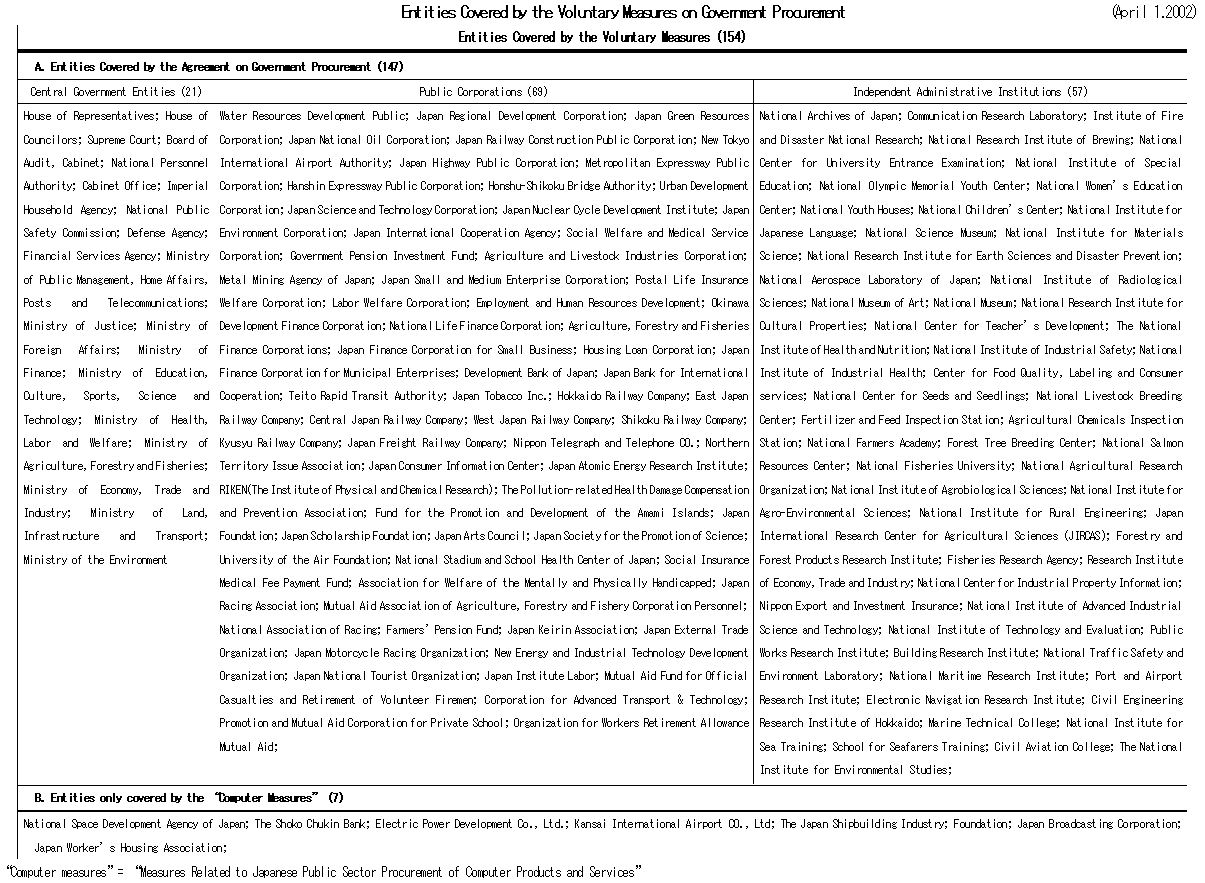
a. The system under the former Agreement on Government Procurement
Various regulations were stipulated under non-discrimination and national treatment policies, etc., in the GATT Agreement on Government Procurement which came into effect in 1981. However no regulations were stipulated in regard to complaint review procedures.
On the other hand, regulations relating to a system of complaint review procedures have been established in each voluntary measure adopted by the Action Program Committee, and a complaint review procedure is implemented based on these regulations.
b. The system under the new WTO Agreement on Government Procurement (reference material I - 5)
The WTO Agreement on Government Procurement came into effect in 1996 at the Uruguay Round of GATT. In addition to the regulations regarding non-discrimination and national treatment policies found in the former Agreement, in regard to complaint review, Article 20: Challenge Procedures, was established.
It thus became necessary for the Government of Japan to develop a system, incorporating the system for complaint review procedures which had been in place until that point, in order to carry out its duties according to the new Agreement, in the period before the new Agreement on Government Procurement came into effect. For this purpose, the Office of Government Procurement Review was established following a Cabinet decision, "The Establishment of Headquarters of Government Procurement Review" on 1 December 1995. It was determined that the Headquarters would set up a Government Procurement Review Board to handle complaints, and the responsibility for the complaint review procedure based on the voluntary measures decided by the Action Program Committee was transferred to a new organization.
In conjunction with the reorganization of the central ministries on January 6, 2001, this office is established in the Cabinet Office.
c. Recent complaint cases (except cases on public work)
Case No.5
1. Date of filing of the complaint: May 29, 2002
2. Name of complainant: Lotte Engineering and Construction
3. Name of the procuring entity concerning the complaint: Tokyo Regional Civil Aviation Bureau, Ministry of Land, Infrastructure and Transport
4. Name of procured goods/services concerning the complaint: construction of new multilevel car parking tower (east side) at Tokyo International (Haneda) Airport
5. Outline of complaint:
As undermentioned, the procuring entity violated the "Agreement on Government Procurement". The complainant called for a loosening of conditions for participation and for a public notice to be made again.
(1) The procuring entity imposed such conditions for participation on the representative of joint ventures as experience of construction of a new multilevel car parking tower whose total floor space is more than 55,000 m2. However, the rational reason behind this limiting condition is not clear. The procuring entity is in violation of the Agreement on Government Procurement which stipulates that any conditions shall be limited to those which are essential.
(2) The procuring entity also imposed such conditions as assignment of a full-time engineer who has experience of construction of a new multilevel car parking tower whose total floor space is more than 55,000 m2. However, there are no firms able to fulfill this condition among Korean firms. This participation condition is in violation of the Agreement on Government Procurement which stipulates that the procuring entity shall not discriminate between domestic and foreign suppliers.
6. Outline of the status of complaint review
The Government Procurement Review Board released a report on the case, and sent it to the procuring entity and the complainant on July 8, 2002. In the report, the Board ruled that the complainant's petition had been rejected because it was filed after the lapse of the filing period defined in the Review Procedures for Complaints Concerning Government Procurement.
(2) Construction sector
While the bidding and contracting procedures for public works are not covered by the Action Program Committee, the "Major Projects Arrangements" and the "Additional Measures of the Government of Japan on Major Projects Arrangements" were adopted by the Cabinet, in May 1987 and in July 1991, respectively, both of which were intended to increase access to large scale public works projects. Furthermore, in January 1994, the "Action Plan on Reform of the Bidding and Contracting Procedures for Public Works," which included adoption of open and competitive tendering procedures for procurement with a value above a certain threshold, was adopted by the Cabinet. In order to improve the actual operation of the Action Plan, Operational Guidelines with Respect to the Action Plan on Reform of the Bidding and Contracting Procedures for Public Works were drafted in June 1996. (Administrative Vice Ministers' Conference).
In November 2000, in the context of these measures, "Act for Promoting Tendering and Contracting for Public Works" was enacted to promote transparency and fair competition in tendering and contracting procedures for public works. The law entered into force in April 2001.
